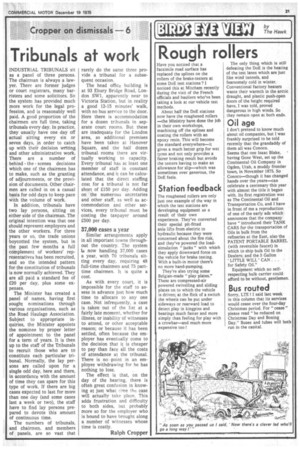Tribunals at work
Page 23

If you've noticed an error in this article please click here to report it so we can fix it.
INDUSTRIAL TRIBUNALS sit as a panel of three persons. The chairman is always a lawyer. There are former judges or court registrars, many barristers and some solicitors. So the system has provided much more work for the legal profession, and is reasonably well paid. A good proportion of the chairmen are ftill time, taking tribunals every day. In practice, they usually have one day off actual sitting every six or seven days, in order to catch up with their decision writing and other administrative work. There are a number of behind the scenes decisions which one of the chairmen has to make, such as the granting of adjournments, or the provision of documents. Other chairmen are called in on a casual basis for odd days to keep pace with the volume of work.
In addition, tribunals have two lay persons, sitting on either side of the chairman. The original intention was that one should represent employers and the other workers. For three years or so, the trade unions boycotted the system, but in the past few months a full complement of workers' representatives has been recruited, and so the intended pattern for the constitution of tribunals is now normally achieved. They are all paid a standard fee of E20 per day, plus some expenses.
The Minister has created a panel of names, having first sought nominations through various organisations, such as the Road Haulage Association. Subject to appropriate inquiries, the Minister appoints the nominee by proper letter of appointment to the panel for a term of years. It is then up to the staff of the Tribunals to recruit those who are to constitute each particular tribunal. Normally, the lay persons are called upon for a single odd day, here and there, in accordance with the amount of time they can spare for this type of work. If there are big cases expected to last for more than one day (and some cases last a week or two), the staff have to find lay persons prepared to devote this amount of continuous time.
The numbers of tribunals, and chairmen, and members of panels, are so vast that rarely do the same three provide a tribunal for a subsequent occasion.
The head office building is at 93 Ebury Bridge Road, London SW1, apparently near to Victoria Station, but in reality a good 12-15 minutes' walk, with no bus service to the door. Here there is accommodation for a dozen tribunals in separate court rooms. But these are inadequate for the London area, so additional premises have been taken at Hanover Square, and the half dozen tribunal rooms there are virtually working to capacity. Every tribunal has at least one member of staff in constant attendance, and it can be calculated that the direct staffing cost for a tribunal is not far short of £150 per day. Adding on the numerous secretaries and other staff, as well as accommodation and other services, every tribunal must be costing the taxpayer around £500 per day.
37,000 cases a year Similar arrangements apply in all important towns throughout the country. The system Is now handling 37,000 cases a year, with 70 tribunals sitting every day, requiring 48 full-time chairmen and 75 parttime chairmen. It is quite a cost.
As with every court, it is impossible for the staff to assess in advance just how much time to allocate to any one case. Not infrequently, a case is taken out of the list at a fairly late moment, whether for illness, or inability of witnesses to attend, or other acceptable reason; or because it has been settled, often because the employer has eventually come to the decision that it is cheaper to pay than face all the costs of attendance at the tribunal. There is no point in an employee withdrawing for he has nothing to lose.
The effect is that, on the day of the hearing, there is often great confusion in knowing at just what Time the case will actually take place. This adds frustration and difficulty to both sides, but probably more so for the employer who is bound to have brought along a number of witnesses whose time is costly.
• Ralph Cropper












































































